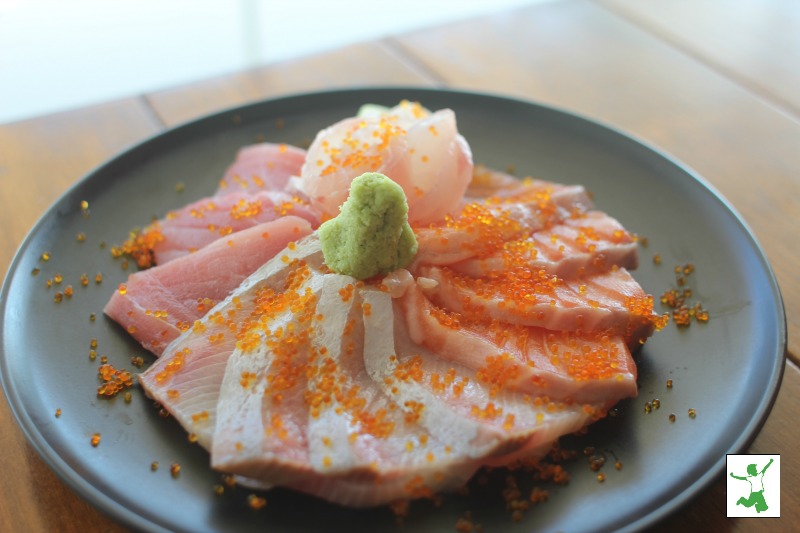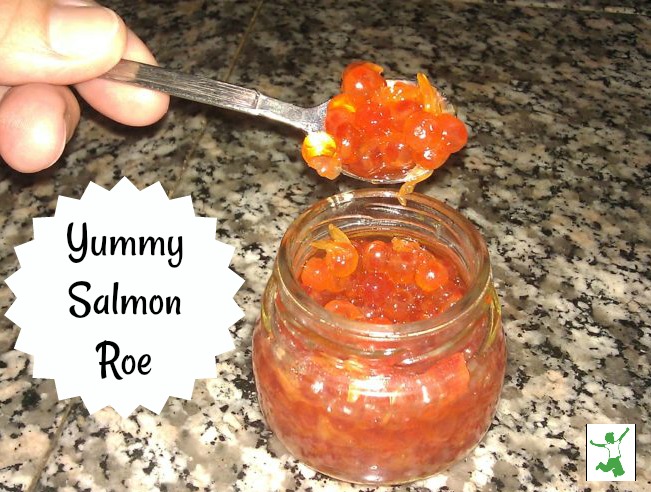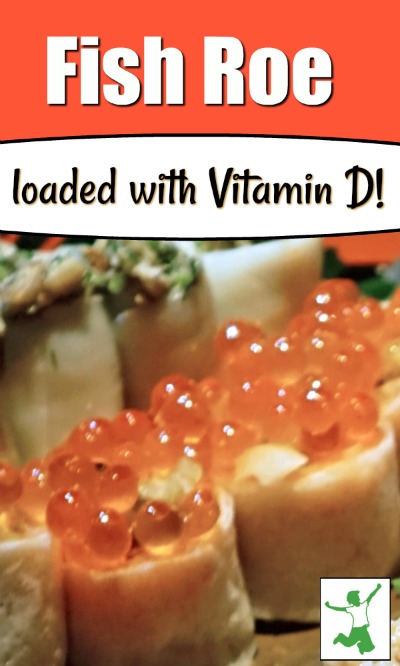Fish eggs are extremely high in vitamin D and a much safer and better choice than drops or pills for resolving this common nutritional deficiency. What to look for to source the highest quality roe with no additives.

Are fish eggs, also referred to as fish roe, a better choice than Vitamin D drops for resolving worrisome signs of vitamin D deficiency?
Vitamin D is surely the darling of supplements at the moment. More and more exciting news keeps coming out about this Wonder Vitamin and its beneficial effects in reducing the chances of many kinds of cancer, heart disease, and autoimmune disorders. The research is simply too groundbreaking to ignore.
I wrote a couple of posts last year about how the seasonal flu is really just Vitamin D deficiency disease and why I take a cod liver oil supplement every day even when I get good doses of midday Florida sunshine. I find the role of Vitamin D in the body and its ability to preserve health and reduce inflammation of all kinds very exciting.
Nearly 80% of People Deficient in Vitamin D
According to a study published by the peer-reviewed Archives of Internal Medicine, nearly 80% of Americans were deficient in this critical nutrient in 2009. Is it worse today? I would wager that it probably is given the advent of smartphones and less time spent outdoors! (1)
These numbers have even conventional doctors jumping on the bandwagon with more frequent testing. Supplementation is the solution commonly recommended when Vitamin D levels are too low to reap any health benefits.
While I think the enthusiasm over Vitamin D is wonderful, I personally do not feel comfortable with the casual way that high dose Vitamin D supplements are being recommended.
In some ways, it seems like Vitamin D has become just another drug!
Taking a single vitamin or nutrient in isolation is a practice that should be used with caution. This is especially true with Vitamin D, which is fat-soluble. Toxic blood levels from supplementation can and do occur.
For this reason, a food-based supplement that supplies Vitamin D is safer. In addition, a whole food source like high vitamin cod liver oil supplies not only Vitamin D, but also Vitamin A and other nutritional cofactors which work synergistically to prevent toxicity.
Watch out, though. Many cod liver oil brands are high-heat treated, which destroys the natural Vitamin D. Synthetic Vitamin D is added back after processing, but this fact is not indicated on the label.
Be sure to use only brands that do not heat the oil. This is the vetted and tested brand I use.
Vitamin D Foods and UVB Sunshine
What if your Vitamin D blood levels are so low that you can’t take enough cod liver oil each day to bring them up very quickly?
What if you live in a climate where getting a decent dose of midday UVB sunshine to produce Vitamin D via the skin is not an option for a substantial portion of the year?
Clearly, taking more than a teaspoon or two of cod liver oil each day to try and boost Vitamin D levels is not the answer in these situations.
Too much cod liver oil each day results in consuming too many omega 3 fatty acids. This can be just as bad as too little. Both scenarios can result in inflammatory conditions in the body.
In those instances, then, larger doses of Vitamin D are obviously required in addition to the daily dose of high vitamin cod liver oil.
However, there is a better and safer way to increase your Vitamin D blood levels quickly without those potentially dangerous high dose Vitamin D drops and pills!
Fish Eggs: Traditional Sacred Food to the Rescue
Fish eggs, also known as fish roe, were highly prized by the natives of South America who would sometimes travel hundreds of miles from their mountain villages down to the sea to procure it in dried form. This superfood was then provided to women of childbearing age to ensure healthy and robust babies and children.
The Eskimos also consumed fish roe from a number of fish species, particularly salmon. Fish eggs were dried for consumption during winter months and for special feeding to pregnant women.
How Much Vitamin D in Fish Roe?
It is no wonder fish roe was so highly prized by isolated natives.
According to an analysis carried out by the Weston A. Price Foundation, a single tablespoon of fish roe contains approximately 17,000 international units of vitamin D. (2)
In addition, fish roe contains vitamins A, K2, zinc, iodine, and the brain supporting omega 3 fatty acid DHA in ample amounts.
One tablespoon of fish eggs, then, supplies a similar amount of Vitamin D as a midday dose of Vitamin D on the skin!
Incidentally, one tablespoon of pastured lard clocks in at 10,000 IU of Vitamin D according to tests by the Weston A. Price Foundation. This healthy fat is a great alternative for those who are allergic to fish.
Synergistic Nutrients
Vitamin A and particularly Vitamin K2 work synergistically with Vitamin D to prevent toxicity and over calcification of the soft tissues, bones, heart, and/or kidneys, hallmark symptoms of Vitamin D overdose. The K2 can be the animal form (MK-4) or the fermented form (MK-7).
Given this information, doesn’t it seem much wiser to use fish eggs as that big Vitamin D boost rather than potentially dangerous and untested Vitamin D drops and pills?
The truth is that no one really knows what the long term effects of taking large doses of Vitamin D in isolation will be. Do you really want to be a guinea pig or do you want to use the safe and effective Vitamin D boost that the Eskimos and traditional mountain-dwelling tribes of South America used when sunlight was not a readily available option?
Where to Get Fish Eggs
I buy small glass jars of salmon roe at gourmet grocery stores for as little as ten to fifteen dollars.
The brand of fish roe I buy has only 3 ingredients: fish roe, salt, and water. Make sure the brand of fish eggs you choose does not contain any preservatives or colors added.
If you can find a fresh or dried source of caviar, so much the better!

How to Eat Roe
I love my salmon roe right off the spoon.
I eat 1/4 – 1/2 tsp in the morning with breakfast a few times a week. They are so salty and delightful. If you aren’t sure you like it at first, try it a few more times as roe can sometimes be a bit of an acquired taste.
If you simply can’t get used to fish eggs off the spoon, try some topped on whole-grain crackers with some creme fraiche.
Another option is to eat sushi! Many recipes for sushi rolls are topped with generous amounts of fish eggs.
Note that fish roe make great finger food for toddlers!
In my mind, fish eggs are a much superior – and delicious method for quickly raising and maintaining optimal Vitamin D levels.
What is your favorite way to eat fish roe? Do you like it off the spoon as I do?








Facebook seems to have a stammer today 😉
I serve devilled eggs with little dollops of salmon roe and horseradish on top, or just use taramasalata instead of mayo in the devilled egg yolks. As a side or a light lunch with green salad we – adults and toddler – love them!
@Ashley, if your baby is breastfed, I would think YOU taking the Vit D drops would be good enough. That’s what our holistic pediatrician recommended for my baby and me. It will pass on to the baby thru your milk.
Something to think about. We are all on D3 drops. I know WAP recommends nursing moms take 20K IU’s of Vit A! I’m taking that, but not from a whole food source. I wonder if that is problematic.
Besides CLO, there is really nothing you can eat to give you vitamin D3. However, you can bask in the sun during the middle of the day assuming you are in a good area at the right time of the year.
The fermented cod liver oil is actually mostly D2.
I eat fish eggs but I am wondering about quality. The ones that I get have been salted (salt cured?) and I was wondering what kind of impact this might have on the health of the eggs…?
@Phthalo, this whole post is referring to supplements. Supplements are derived from the vitamins and nutrients that come from our food. I’m not an advocate of vitamins or herbs in supplement form generally. I’m not sure what you’re assuming there. Respectfully.
Good to know. Pediatrician prescribed Vit D drops for my 2wk old bc shes exclusively breastfed, was at WIC office for lactation support too and they backed him up but Ive been feeling iffy on it all.
@Carma: not everyone that eats well is healthy. I probably eat healthier than anyone on this site and my body does not absorb the vitamins and minerals from the food. Don’t assume that eating healthy is equated with BEING healthy.
Link to GAPS info? Haven’t heard of it.
By the way, thank you for showing me GAPS, your blog is my nutrition bible.
Good luck with GAPS Alyssa. It is quite the adventure! 🙂